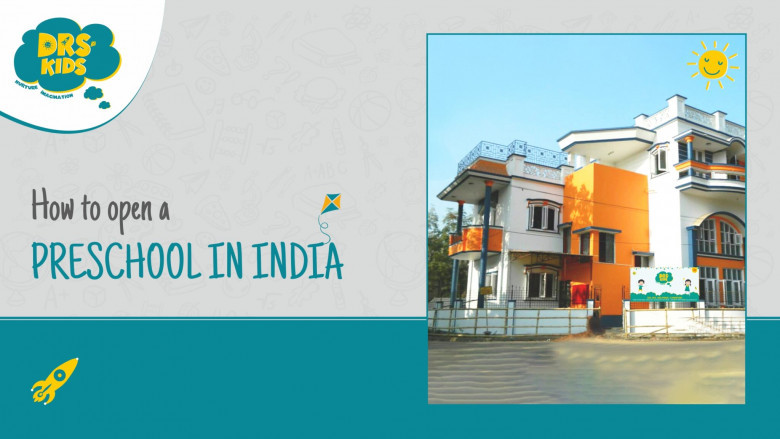
How to open a preschool in India
Importance of a Preschool
Legal requirements
Legal requirements are the main focus of our blog, and we shall talk at length about this whole section. Not long ago, preschools were considered part of the unorganized sector of education, very little importance was given to the preschools. However, a lot of things have changed over the last two decades. The number of preschools has seen immense growth. Many factors are responsible for this. Some of these are an increase in family income and awareness of parents who understand the importance of early childhood education and the impact quality pre-schooling has on the minds of little ones in their overall development. Numerous researches show that how important preschool is for children’s overall development. It helps in laying the proper foundation and preparing children in a better way for primary school. These factors have been the main reason behind most individuals and organizations starting preschools in India. As the demand for preschools has skyrocketed, the schools have grown into large networks of preschools with branches across the country. Some are individual/family-owned preschools, while others belong to some well-known organizations that have started the ‘preschool franchise’ opportunities for individuals, educationists, and businesses.
Pre-school is related to young lives whose health, safety, and security are of the most critical importance. As a result, the government laid down various rules and regulations, which have to be adhered to. Here are some of the most important legal requirements for starting your own pre-school in India:
- Many state governments have made the laws such as the “Private School Education Acts” These laws regulate various aspects related to the running of a school. Hence, you must make sure that you follow these laws before starting a preschool. These regulations make it necessary for you to obtain the registration to run your pre-school.
- There is a special Conventions on Rights of the Child, enacted and enforced by the United Nations, that makes it incumbent upon member nations to respect the civil, political, economic, social, health, and cultural rights of children laid down by the Convention. The convention came into effect in the year 1990. India ratified it in 1992. All the signatories of this convention have to abide by it. Consequently, laws concerning children in India have ensured compliance with the convention norms.
- The Right to Education Act (RTE) in India came into effect in the year 2009. This was a revolutionary law as it made education a fundamental right for children between the ages of 6-14 in India. The law outlines responsibilities for various stakeholders, including the government, teachers, schools, and parents. The law also has laid down norms regarding student-teacher ratios. Under the law, a child can only be awarded punishment permissible under RTE 2009. In Section 11 of the Act, it has been mentioned in unequivocal terms that the government should make arrangements for imparting free education of preschool level to children in the 3-6 years age group. This would help in laying a sound foundation for their future learning and teaching.
- The government formulated the National Early Childhood Care and Education (ECCE) Policy. This policy states that the period between 0 to 6 years is vital for a child’s mental and intellectual development. Consequently, the government has made specific regulations for children belonging to this age group. These regulations finally got a place in the National ECCE Policy in 2013. It states that its goal is to ensure that all children in the 0-6age group have access to preschool education and care. This is done by laying down a strict set of rules and guidelines that must be followed for running preschools and daycare centers.
Preschools laws and guidelines:
- Establishment of Playschools- Private parties run a major percentage of preschools in India. Preschools are required to register with the district-level nodal officer. The preschool must apply for recognition to the concerned officer.
Checklist for parents choosing a preschool for their children
- The preschool must possess a valid Recognition Certificate from the District Nodal officer.
- The nodal certificate needs to be renewed annually.
- The authorities may revoke this recognition at any point if the preschool is found to have violated the laid-out norms. Parents must be aware and vigilant regarding this certification of the preschool.
The ECCE policy has outlined many laws. Here are some of them:
- Governing Staff: As per ECCE, both teachers and caregivers have a crucial role in developing a child. The staff must be welcoming and loving for the preschool children to ensure a friendly and comfortable environment.
- Safety: The safety and security of minor children cannot be compromised. To ensure safety part, there are several regulations in place in the ECCE policy. All the safety measures are supposed to be met to ensure a safe and sound environment of the preschool.
- Prevention of physical and mental harassment: Children at a young age are quite vulnerable and have an impressionable mind. An educational institution must take utmost care to ensure that the child is not physically or mentally abused by any means. Section 17 of the Right to Education Act (2009) lays out the rules to prevent mental and physical abuse of children.
- Health: Physical and mental health of children holds the highest priority. The policy recommends that preschool classrooms should be equipped with proper ventilation. Also, preschool must take action to ensure good hygiene and sanitary conditions in the premises.
- Curriculum: If you wish to start a preschool, you must thoroughly read the laws and directions on curriculum, pedagogy, and teaching methodology given in the policy document. After reading, you must make sure that your preschool follows all the rules mentioned there.
- Parent-Teacher Association: The policy recommends creating a Parent-Teacher Association for every preschool within a month of the admissions every year.
Planning and research
- Selection of location: A preschool isn’t something you wake up one morning and set up. You have to research various factors before setting up a pre-school. You have to know what things you require for setting up your pre-school. You will have to dig deep to find out about the competition you will be facing. If you set up a school in an area with some already well-established schools, you will suffer due to competition. Your enrolments will be significant, and you might not be in a position to run your school. Your pre-school project won’t be financially viable. Hence, having a good business essential our preschool is necessary if you want to succeed. You can use internet resources such as web search and searches on local listings. This will help you with schools’ presence and gauge the level of competition in the area you aim to target. Another important factor to consider while selecting a location is the proper environment for your students. If you set up for school in an area that is crowded, or has a busy traffic, you might be risking your students’ physical health. This is something parents consider as very important. Another issue is that of proximity. Your school shouldn’t be too far away from the main inhabited areas. This is because parents generally avoid schools that are too far away from the place where they live.
- Deciding on School name: Unless you are a franchisee looking to start a franchise of an already well-established pre-school brand, you need to do a lot of research on the selection of the name of your school. You must be careful not to copy some other school’s name as that will land you in legal trouble. A good school name should reflect your brand value and something parents of your would-be students are able to connect with. After you have decided on your school name, do not forget to register it to avoid copyright infringement. Also, deciding on a school logo is very important. If you want, you may try and get a trademark on this logo to earn protection under the government’s intellectual property rights laws.
- Deciding curriculum: Once you have decided on the name of your school, you should set about brainstorming for preparing a curriculum for your students. A well-structured curriculum will help your students learn things in an easy and organized manner and help your teachers teach them efficiently and effectively. A curriculum is related to the question of nurturing a child’s mind. A well-nurtured mind goes on to shape their lives and the lives of others they are associated with. A good curriculum also needs to be scientific. By scientific, we mean that it should be designed in a way that takes care of the grasping power of a child as they grow. It should be practical rather than idealistic. Only then will it benefit the young minds, which is the end goal of your pre-school.
- Selecting teachers: Once the curriculum for your pre-school is ready, you should start the search for good teachers. We can not underestimate the importance of teachers in imparting the gift of education to children. Over the years, various researches and committees, such as ASER, have suggested that learning gaps among young children develop due to a lack of quality teaching. Pre-school is the foundation of a child’s career edifice. If a child learns things well now, it will prepare a solid foundation for their future learnings. This is where the role of a good teacher comes in. So, no amount of effort in having good quality teachers in your pre-school is enough.
Running a pre-school will also require you to maintain a proper record of all the expenses and income. Therefore, accurate accounting is a must for the long-term financial viability of your pre-school.
Conclusion













